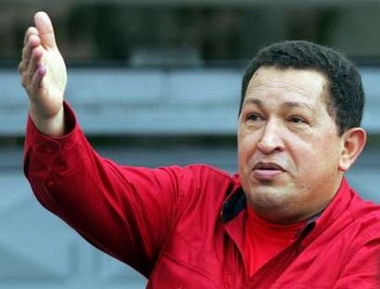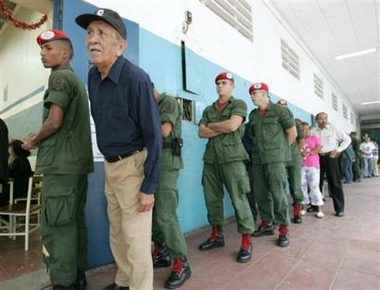|
Venezuelans hold congressional elections
(AP)
Updated: 2005-12-05 09:07
Candidates aligned with President Hugo Chavez were widely expected to
increase their legislative majority Sunday as Venezuelans voted for a new
National Assembly in an election boycotted by several opposition parties.
Chavez dismissed the boycott as a failed ploy to sabotage legitimate
elections and avoid an embarrassing defeat, and officials later blamed a
pipeline explosion on government opponents.
"The whole world knows a true democracy is in motion here in Venezuela,"
Chavez said after voting at a school where cheering supporters greeted him
outside.

Venezuelan President Hugo Chavez greets
supporters after casting his ballot during legislative elections in
Caracas, December 4, 2005. [Reuters] | Although Venezuela's main opposition parties announced they were boycotting
the vote, Chavez noted only 10 percent of candidates had formally dropped out.
He accused the United States, with which he often clashes, of being behind
the boycott �� a charge Washington has denied.
The boycotting parties said they did not trust the voting system. Chavez said
Venezuela has the most solid electoral system in South America, and that its
integrity was secure despite "attempts to sabotage this process."
Officials and election observers said the voting proceeded peacefully Sunday,
while thousands of soldiers were deployed to keep order. The military said it
stepped up security at oil installations to prevent any possible sabotage in the
country, the world's No. 5 oil exporter.

Venezuelan soldiers and civilians line up to
vote at a poll station in Caracas, Venezuela, Sunday, Dec. 4, 2005.
[AP] | Government officials reported several
disturbances leading up to the vote, including blasts from small explosives that
injured three people in Caracas on Friday and a pipeline explosion Saturday
night in the western state of Zulia.
Interior Minister Jesse Chacon said C-4 explosives were used to blow up the
pipeline and that officials believed the perpetrators were government foes
trying to destabilize the country. Investigators found remnants of C-4
explosives at three spots on the pipeline, Chacon said.
"We already know who is behind this situation, and we have made some
detentions," Chacon said, without giving details.
Chavez said the situation in the country was calm and that such acts had no
effect on the voting process.
Oil Minister Rafael Ramirez blamed the same opponents who unsuccessfully
tried to oust Chavez in a two-month strike that ended in early 2003.
Chavez said traditional parties that withdrew would be responsible for their
own demise, and he cited electoral figures showing that only 556 of more than
5,500 candidates had quit the race.
"They are old parties that are already dead," Chavez said. He added that
boycotting parties could emerge "not only delegitimized but also illegal." He
did not elaborate.
Candidates allied with Chavez hold 89 of the National Assembly's 165 seats
and are aiming to increase their majority in an expanded 167-member congress. If
they win a two-thirds majority, some pro-Chavez lawmakers have said they would
consider changing the constitution to extend term limits for all offices,
including the president.
Chavez said any constitutional changes would have to be considered later, and
that the choice would not be up to him.
Chavez supporters called the boycott a desperate stunt by an opposition that
polls predicted would have soundly lost.
"If they really are democrats, they should be participating," said Jesus
Acosta, a 47-year-old accountant who waited in line to cast his ballot outside a
school.
The boycotting parties argue the National Electoral Council is pro-Chavez,
there are irregularities with the voter registry and the touchscreen voting
machines are vulnerable to confidentiality breaches.
Julio Borges, an opposition presidential candidate whose Justice First party
was boycotting, called it a sad day and said his party hoped to eventually
achieve "total confidence" in the electoral system.
The Organization of American States, which has 60 observers monitoring the
vote, said last week that "important advances" had been made to generate
confidence in the elections. The European Union has an additional 160 observers
on hand.
Chavez was elected in 1998 promising a revolution for the country's poor and
is up for re-election next year. His enemies tried to overthrow him in a
short-lived 2002 coup, backed the crippling oil strike that died out in early
2003 and organized a failed recall referendum last year.
|